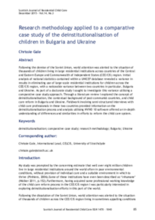This article discusses how at the end of the Soviet Union the world was alerted to the situation of thousands of children living in large residential institutions across countries of the Central and Eastern Europe and Commonwealth of Independent States (CEE/CIS) region.
The study discusses a variance in results in eliminating use of large-scale residential institutions for children across the CEE/CIS region. In particular, there was noticeable variance between Bulgaria and Ukraine. The researcher investigated this variance using a comparative case study approach. The researcher employed a literature review to explore “the concept of deinstitutionalization, the contextual background of post-communist countries, and child care reform in Bulgaria and Ukraine.”
The researcher also conducted fieldwork involving semi-structured interviews with child care professionals in both Bulgaria and Ukraine. These interviews provided information on the deinstitutionalization process and analysis.
The study determined that it would be in the best interest of the children in to close of large residential institutions, as well as instate a multi-faceted child care reform process incorporating programs that help to prevent child and parent separation. Programs that support family reunification should be used whenever possible.
The researcher further concluded in regard to Bulgaria and Ukraine that there are variances and similarities in deinstitutionalization efforts in both the processes and achievements in each country.

